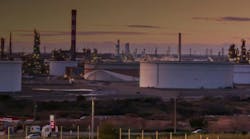The US should encourage increased and diversified energy production from a range of foreign suppliers, especially those in more secure areas, senior officials of the George W. Bush administration told a congressional committee June 20.
Speaking before the House Committee on International Relations, Alan Larson, undersecretary for economic, business, and agricultural affairs at the US Department of State, stressed that an effective energy security policy must have important international dimensions, given that the US has only 2% of proven world oil reserves. By comparison, two thirds of world oil reserves are in the Middle East.
The US, as well as Europe and Japan, rely on imports to meet a large and growing portion of its oil needs, Larsen said, while "significant amounts of oil are controlled by problem states."
And because markets are global, energy market disturbances that initially affect local regions will transmit economic aftershocks to the US.
Strategies
Although global oil markets are by their nature unpredictable, the US and its allies can reduce the impact of physical oil supply disruption through the coordinated use of strategic stocks and the encouragement of spare oil production capacity, Larsen said.
In addition, the US should encourage major oil producing countries to maintain responsible production policies that give full weight to their interest in preserving a growing world economy and a less volatile international oil market, Larsen said.
Friendly neighbors
The Bush administration also is working hard to nurture dialogues with friendly oil producing countries such as Mexico, Canada, and Venezuela and to encourage US production, said Sec. of Energy Spencer Abraham.
"We are committed to ensuring that America's energy needs are not held hostage by politically unstable foreign suppliers. We are taking the necessary steps to encourage increased domestic production, while protecting the environment and diversifying our sources of energy," he said.
But Abraham stressed that looking to be more energy-efficient is as important as encouraging new supplies.
"As our economy expands, however, demand for energy will increase, and our dependence on foreign suppliers will continue to rise. We are committed to protecting our economic well-being and our national security through an emphasis on energy efficiency and conservation to reduce energy consumption, continued reliance on the efficiency of the free market, diversification of foreign suppliers, increased domestic production, and emergency preparedness for potential supply disruptions."
Industry view
Oil producers, meanwhile, said that even with more conservation, the US will still need to look aggressively for ways to satisfy its energy needs.
Citing US Energy Information Administration projections, the American Petroleum Institute said the "US and the world will consume substantially more oil and natural gas in the decade ahead, even with robust growth in alternative fuels and more conservation."
The association predicted that petroleum companies will need to invest about $1 trillion over the next 10 years to find and produce the necessary new supplies of oil and gas.
API statistics show that the nation imported nearly 60% of its crude oil and oil products in the first quarter of this year and that US companies are producing and importing crude oil from many different nations.
During this period, the US imported 9.5% of its oil from Canada, 7.7% from Saudi Arabia, and 7.3% from Venezuela. Total oil imports from all Persian Gulf nations totaled 13.2%.

